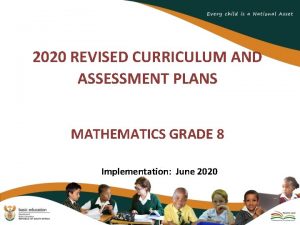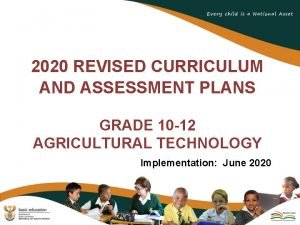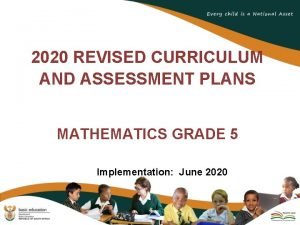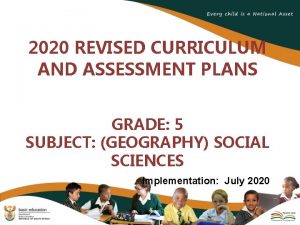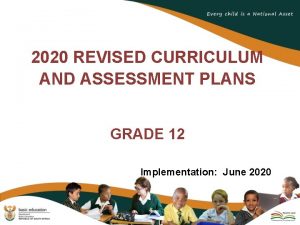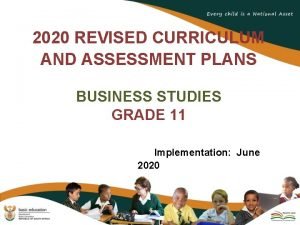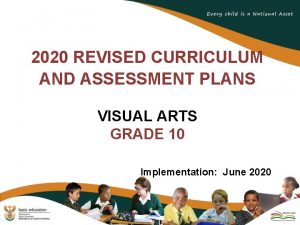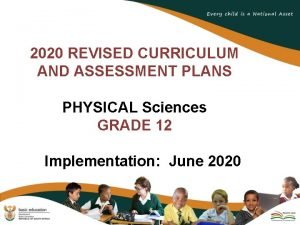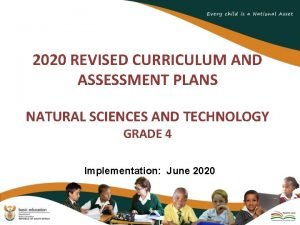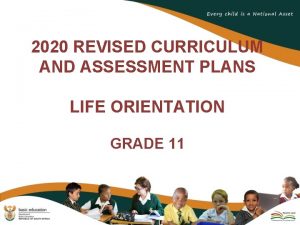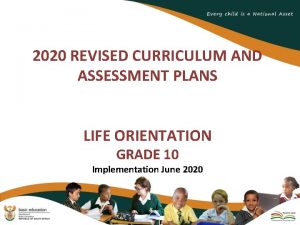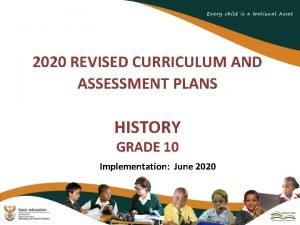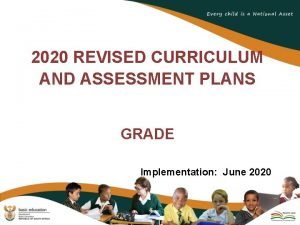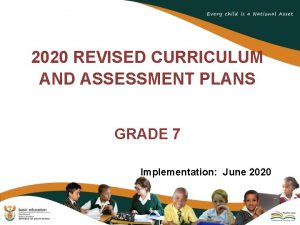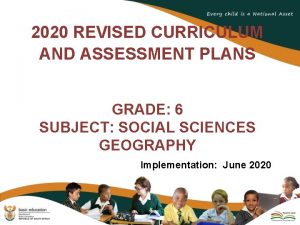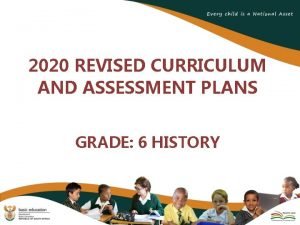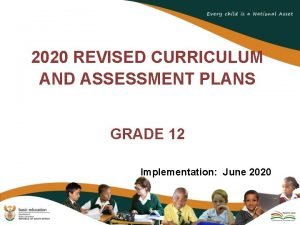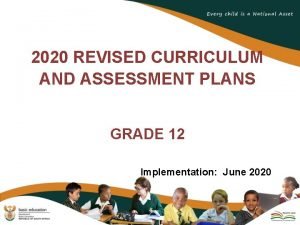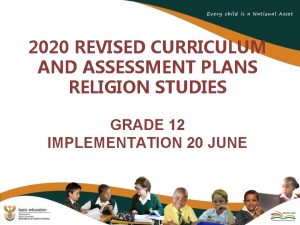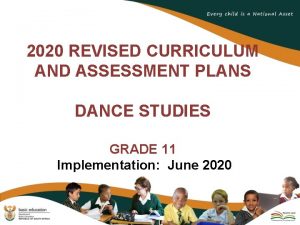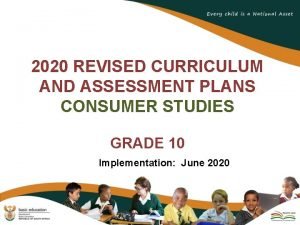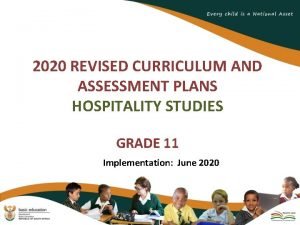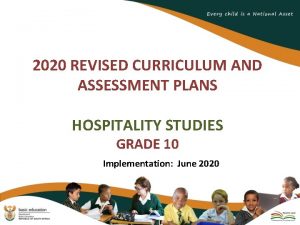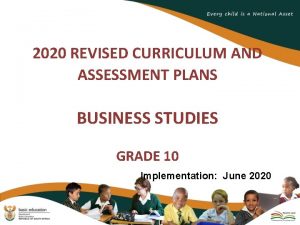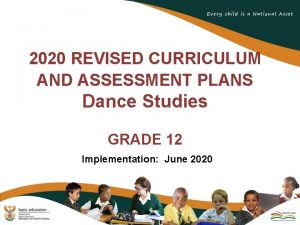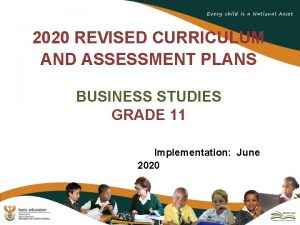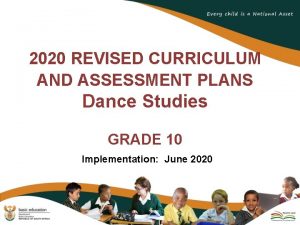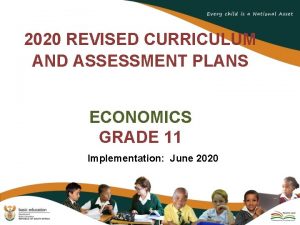2020 REVISED CURRICULUM AND ASSESSMENT PLANS RELIGION STUDIES




















- Slides: 20

2020 REVISED CURRICULUM AND ASSESSMENT PLANS RELIGION STUDIES GRADES 10 and 11 Implementation June 2020

Presentation Outline 1. Purpose 2. Amendments to the Content Overview for the Phase; 3. Amendments to the Annual Teaching Plan; 4. Amendments School Based Assessment (SBA) 5. Conclusion

1. Purpose • To mediate the amendments of the trimmed and re-organised 2020 Annual Teaching Plan including School Based Assessment for Religion Studies, Grade 10 -11 for implementation in June 2020 as stipulated in Circular S 2 of 2020. • To ensure that meaningful teaching proceeds during the remaining teaching time as per the revised school calendar. • To assist teachers with guided pacing and sequencing of curriculum content and assessment.

1. Purpose (continued) • To enable teachers to cover the essential core content /skills in each grade within the available time. • To assist teachers with planning for the different forms of assessment. • To ensure learners are adequately prepared for the subsequent year/s in terms of content, skills, knowledge, attitudes and values

2. Amendments to the Content Overview for the Phase

SUMMARY: AMENDMENTS TO THE CONTENT OVERVIEW FOR THE PHASE RS GRADE TOPIC GRADE 10 1. Variety of Various clusters of religions The beginnings of the religions of 2. Common Definitions of religion features of Aspects of understanding religion as Major dimensions common a generic to all religions and Origins of religions unique phenomen Roles of social forms, institutions and roles in religion on GRADE 11 Main developments of religions The mutual interdependence of the world religion (Clustered topics) The nature of the religions in South and social factors Africa Influence and adaptation between Statistical spread of religions Important concepts Interaction of religions Approaches aimed at interreligious (Reduced ) dialogue Social forms that have been produced in various religions Leadership roles produced in various religions Reduced number examples GRADE 12 Conceptual distinctions Internal differentiations within religions Main features of such differentiations Unique features of various religions History and present dynamics of inter-religious relationships Symbols Religious teachings Theories about religion The central teachings in one religion The nature and role of narrative and Normative sources in various myth in religions Types of rituals and their role in Interpreting one normative source religions Analysis of secular worldviews Concepts: faith, worship, prayer, The origin, purpose and influencing meditation, mysticism, spirituality factors behind at least two and the artistic expression of religion worldviews Reduced number of concepts

SUMMARY: RS AMENDMENTS TO THE CONTENT OVERVIEW FOR THE PHASE Topic GRADE 10 GRADE 11 GRADE 12 3. Topical issues in South in society Africa Topical issues in Africa and the world Removed the world Principles of ethical decision-making pertaining to public life Religions and economics Critical analysis of the relationship between religions and economics Religion and the state How religious beliefs influence the development of state policies and practices Removed some of the beliefs Religion and politics Religions and the natural environment Co-responsibility and cooperation of religions Developing a strategy to solve a major social problem Role of media in influencing public opinion on religion Religious freedom, human rights and responsibilities 4. Research into Important principles of and across research in Religion religions Studies Rituals Inter-religious relationships Interviews on gender issues. Reduced number issues Relaxation and leisure from an ethical point of Religion in areas of conflict in view South Africa, Africa and the world Religion and the natural sciences

3. Amendments to the Annual Teaching Plan

Summary: Content/Topics Amended Content/To Term 2 pics Theories about Reorganised religion: Understanding the term theory Morality and ethics Reduced Amendment Merged Understanding term Theory with concept theory in Religious context To reduce content overload Reduced content on Morality and ethics in religion because themes overlap

Summary: Content/Topics Amended Content/Topic s Specific Historical events Term 2 Reduced Amendment Reduced the number of specific historical events There are numerous events which can be reduced Reduced the number of specific historical events It will be possible to understand the historical event without having to cover all events Interviews on gender Removed Learners will not be able to go out and conduct issues: structured interviews taking into consideration gender, religion, culture and economic backgrounds

Summary: Content/Topics Amended Content/Topics Concepts: faith, worship Ways in which religious beliefs influence the development of state policies and practices, including examples theocracy, state religion, secularism and co-operative model Term 3 Amendment Reorganised Merged the two topics to reduce content faith, worship Reorganised Clustered Ways in which religious beliefs influence the development of The clustering of topics does impact the understanding of the concepts Reorganised Clustered theocracy and state This will reduce contact without affecting understanding of the concepts politics in terms of views Reorganised The relationship of Religions of religions about politics, and how religion influences politics in terms of views of religions about politics, how

Summary: Content/Topics Amended Content/Topics NO TOPICS REMOVED , REDUCED OR REORGANISED Term 4 Amendment TERM 4 IS MAINLY CONSOLIDATION

4. Amendments School Based Assessment (SBA)

Summary: Revised Programme of Assessment Term 2 Term 3 Term 4 Variety of Religions • Interaction of religions: Common features of religion as a generic and unique phenomenon Aspects of understanding religion: - Understanding religions from the point of view of the adherents, Learners’ selfdiscovery as an ongoing process without external expectation to conform, Correlations and patterns Topical issues in society Principles of ethical decisionmaking pertaining to public life: - how people in different religions come to decisions regarding social ethics - The sources of ethical decision-making - Tolerance, respect, propaganda, Dialogue , indoctrination and Syncretism Common features of religion as a generic and unique phenomenon • Definitions of religion: - Compare various definitions of religion - Religion as it is generally defined - Definition of religion in a religious context • Major dimensions common The principles of harmonious to all social existence expounded by various religions Divinity, cosmos, humanity, knowledge, good and the beautiful, sacred and normative tradition, narrative and myth, ethics, rituals, symbol, spiritual experience or spirituality, faith, organisation

Summary: Revised Programme of Assessment Term 2 Term 3 Term 4 Common features of religion as a generic and unique phenomenon The learner’s understanding of religion The relationship of the term ‘religion’ with other concepts such as worldview and belief systems: reflection and impact of concepts on religious interaction • Roles of social forms, institutions And roles in religion. • Social forms and/or institutions that have been produced in various religion Monarchies , Oligarchies, Democracies -Division of power between central Organisations and local organisations. Religions and economics from a Religion Studies perspective - Religious views on the relationship - Ethical principles in religions pertaining to Economics - Influence of religions on economic life - Influence of economics on religions Research into and across religions Inter-religious relationship : an investigative process to develop interviewing skill Develop questions, Establish how interviews should be conducted, Identify the people to be interview Present report, Discuss in class. Leadership roles produced in various religions: Elder, healer, minister, nun, guru, imam, monk, pastor, priest, prophet, scholar, priestess, pundit, teacher, rabbi and roles Based on birthright

4. Amendments School Based Assessment (SBA)

PROGRAMME OF ASSESSMENT GRADE 10 AND 11 Term Assessment task 1 Written task 2 NO ASSESSMENTS 3 Recording 100 Test 100 Assessment (SBA) End-of-year examination Total for end of year YEAR % Reporting 100 300/3 Project or Task School-based 4 MARKS 100% 100 25% 300 75% 400 100%

STRUCTUE OF TEST TERM 3 • Test: One 1 hour 30 minutes paper: 100 marks • Religion studies test will consist of three questions • SECTION A: • Compulsory (30 marks) • SECTION B: • Learners will answer a short-source based questions (30 marks) and extended writing (40 marks)

CONCLUSION AMMENDEMENT FOR COVID 19 1. Amendments to the Content Overview for the Phase 2. Amendments to the Annual Teaching Plan; 3. Amendments School Based Assessment (SBA)

Contact Details Name: CES: Religion Studies Dr K Perumal Department of Basic Education Tel: 012 357 4257 /0843012514 Email: Perumal. K@dbe. gov. za
 2020 revised curriculum and assessment plans
2020 revised curriculum and assessment plans Revised programme of assessment 2020
Revised programme of assessment 2020 2021 revised curriculum and assessment plans
2021 revised curriculum and assessment plans 2020 revised curriculum and assessment plans grade 7
2020 revised curriculum and assessment plans grade 7 2020 revised curriculum and assessment plans
2020 revised curriculum and assessment plans 2020 revised curriculum and assessment plans
2020 revised curriculum and assessment plans 2020 revised curriculum and assessment plans
2020 revised curriculum and assessment plans 2020 revised curriculum and assessment plans
2020 revised curriculum and assessment plans Revised curriculum 2020
Revised curriculum 2020 Revised curriculum 2020
Revised curriculum 2020 Revised programme of assessment 2020
Revised programme of assessment 2020 2020 revised curriculum and assessment plans
2020 revised curriculum and assessment plans 2020 revised curriculum and assessment plans
2020 revised curriculum and assessment plans 2020 revised curriculum and assessment plans
2020 revised curriculum and assessment plans 2020 revised curriculum and assessment plans grade 7
2020 revised curriculum and assessment plans grade 7 2020 revised curriculum and assessment plans grade 7
2020 revised curriculum and assessment plans grade 7 2020 revised curriculum and assessment plans grade 7
2020 revised curriculum and assessment plans grade 7 2020 revised curriculum and assessment plans grade 6
2020 revised curriculum and assessment plans grade 6 2020 revised curriculum and assessment plans grade 6
2020 revised curriculum and assessment plans grade 6 Revised curriculum 2020
Revised curriculum 2020 2020 revised curriculum and assessment plans
2020 revised curriculum and assessment plans
